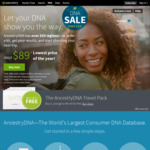Ancestry is running their DNA testing sale again, for the lowest price yet if you buy one ($1 less than last time, in March), or even less — $66.75! — if you buy 4.
I'm considering doing this for the health data, and it seems Ancestry provides — by far! — the most comprehensive usable data at the moment (twice as much as its major competitor: 23andme).
Now, the question is: how to do this so that it doesn't end up costing you more than the price tag, and the data you pay for really belongs to YOU, and no one else: not Ancestry or any government.
The option I'm considering is buying a prepaid debit card with cash and connecting to the site via a VPN to pay for it (Tor may be an added layer of security). Of course a physical address will have to be provided to receive the 'spit kit', but it doesn't necessarily need to be your home one. Anyone seeing any holes in that strategy?




Send in someone else's DNA. That way they'll never trace it back to you.